Universal Health Coverage Day: translating the dream of ‘health for all’ into a reality
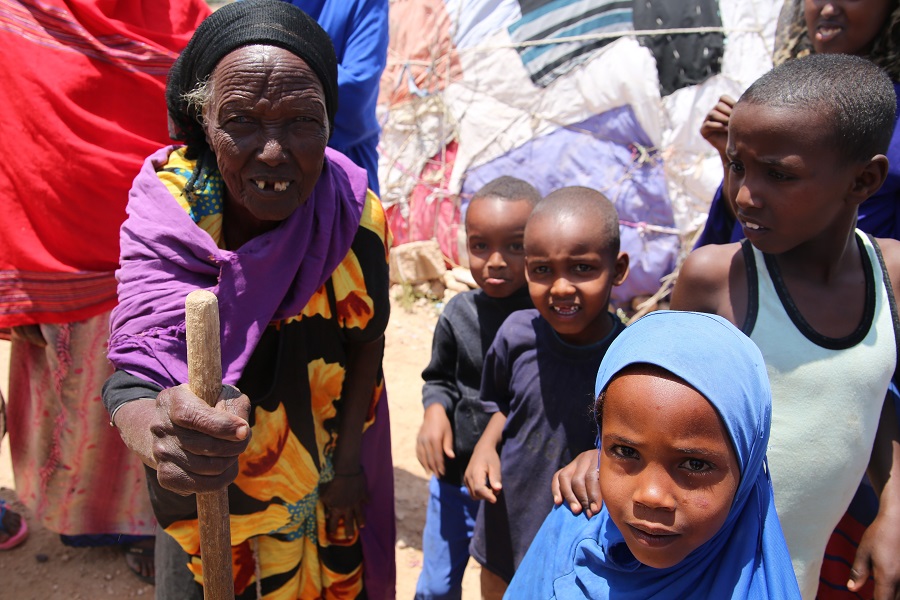 The concept of UHC addresses people of all backgrounds and ages. Credit: Fouzia Bano
The concept of UHC addresses people of all backgrounds and ages. Credit: Fouzia Bano
12 December 2021 – In 2012, in acknowledgement of the role health plays in social, economic and political aspects of life, the United Nations General Assembly passed a resolution urging countries to progress towards the concept of universal health coverage (UHC). UHC means that all individuals and communities receive the health services they need without suffering financial hardship.
To raise awareness about this concept, every year since 2012, UHC Day has been commemorated on 12 December. This year, the theme for the day is ‘Leaving no one’s health behind: Investing in health systems for all.’ This theme is relevant for countries worldwide, including Somalia, particularly after the secondary impacts of COVID-19 pandemic on a fragile health system in the country.
Struggle to pay for health services
In Dusamareb, Galmudug State, as a single mother, Amina Abdulle Mohamud is worried about her 6 children’s future. Her work allows them to cover the daily needs, with limited savings for the future. Her former husband, who is jobless, cannot contribute to the children’s living expenses and the Government cannot offer much support with health and education either.
Recently, Amina’s eldest daughter, Siham, suddenly collapsed. Amina rushed her daughter to the city hospital, where they were referred to a hospital in Mogadishu. While reaching the Digfer Hospital, Amina had already spent US$ 400. After a week of being admitted at the facility, Siham was diagnosed with epilepsy. By the time they returned home, Amina had spent US$ 1200 for treatment of her eldest daughter.
“I come from a middle-class family and I am still really struggling to pay bills and look after the health of my children,” said Amina pensively. “I don’t know how people with less money are coping.”
The Mohamud family is not the only one finding it hard to pay for health services out of their own pockets, with so many other priorities to pay for.
With one of the most tenuous health systems in the world and decades of instability and recurring health emergencies putting communities to test, Somalia has a universal health coverage index of
25 out of 100, which shows how difficult it is to access health services needed.
Plans under way to offer essential package of health services
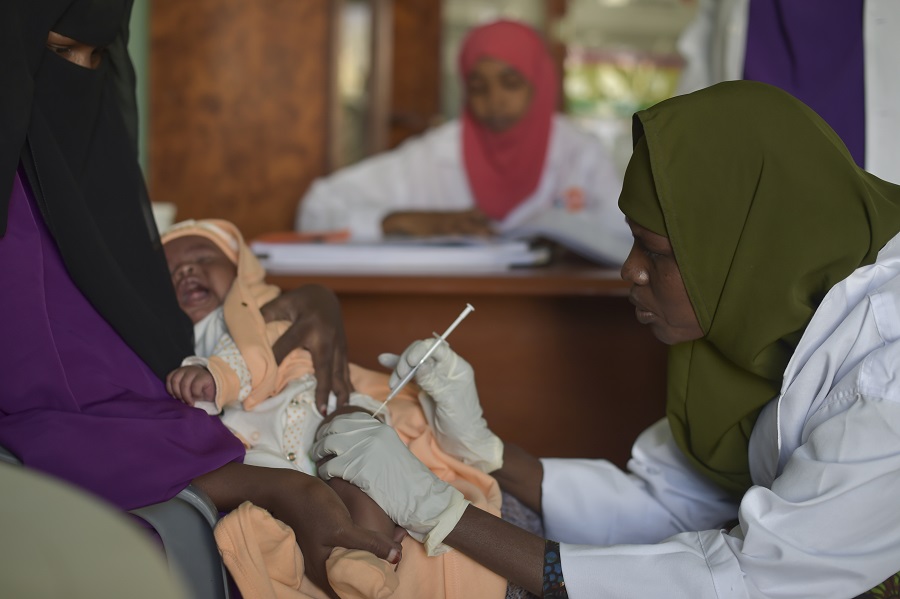 Plans are underway to implement the essential package of health services to reach more families. Credit: Tobin Jones
Plans are underway to implement the essential package of health services to reach more families. Credit: Tobin Jones
In 2018, the Federal Government of Somalia collaborated with the World Health Organization (WHO) and other partners to start the journey of rolling out UHC across the country. UHC comprises the full range of essential, quality health services, from health promotion to prevention, treatment, rehabilitation, and palliative care, all offered to people when and where they need them, and without facing any financial hardship.
Currently, plans are under way to implement a set of prioritized essential package of health services across the country using domestic and external resources, through the primary health care (PHC) approach. This means offering comprehensive, integrated levels of care and services that respond to the health needs of all the people, with a functioning referral system across all levels of care, in order to ensure that families like Amina’s are not pushed into poverty because of out-of-pocket expenditure.
The dream of UHC is achievable
PHC also means taking care of public health goods and functions, with a multisectoral approach to address the wider determinants of health, and empowering people in the field of health. PHC provides the 'programmatic engine' for UHC, the health-related Sustainable Development Goals and health security.
With the steps that WHO is taking in collaboration with the Ministry of Health and partners, the vision in the country is to ensure families like Amina’s do not fall into poverty because of catastrophic health expenditure.
“The dream of UHC is achievable, even in fragile settings,” said Dr Mamunur Rahman Malik, WHO Representative to Somalia. ”The concept of universal health coverage provides a unifying language that brings together social justice, and health equity through basic service provision and can be an opportunity in fragile contexts as the country slowly and gradually recovers from the COVID-19 pandemic. If we are to prevent future pandemics and achieve health and well-being for all by 2030, we must prioritize equity – invest more in health and allocate resources efficiently and equitably according to need of everyone, everywhere."
Related link
Antigen-based rapid diagnostic tests: a game-changer for COVID-19 testing in Somalia
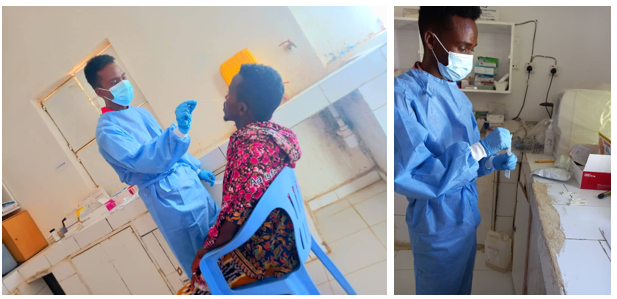 A laboratory technician collects a nasopharyngeal swab sample, then performs COVID-19 testing using Ag-RDT in rural health facility for Ag-RDT testing, Rako district, Karkaar region, referral health centre
A laboratory technician collects a nasopharyngeal swab sample, then performs COVID-19 testing using Ag-RDT in rural health facility for Ag-RDT testing, Rako district, Karkaar region, referral health centre
 Collection of nasopharyngeal swab sample, South West State, Somalia
Collection of nasopharyngeal swab sample, South West State, Somalia
7 December 2021 - As emphasized by the World Health Organization (WHO), testing is one of the key strategies to better understand and monitor the spread and trends of the transmission of SARS-COV-2 virus, which helps in timely detection of cases in order to mount an effective response. When the first case of COVID-19 was detected on 16 March 2020 in Somalia, the country had no testing capacities for SARS-COV-2. Instead, samples collected from suspected cases of COVID-19 in remote and hard-to-reach locations had to be shipped to the Kenya Medical Research Institute (KEMRI) in Nairobi, where 350 such samples were tested between March and April 2020.
To overcome this critical public health gap in the face of a global pandemic, Somalia was able to develop, equip and operationalize 3 molecular testing facilities – one each in Mogadishu, Garowe and Hargeisa – with support from WHO and other partners in record time. However, although this was a key step forward in building national testing capabilities, these laboratories were unable to meet the demand of the entire country for testing and samples collected from hard-to-reach areas still had to be shipped and transported to these 3 laboratories for testing – a process that would take on average 3 to 4 days. This is precisely why the introduction of antigen-based rapid diagnostic tests (Ag-RDT) across Somalia has been a game-changer for COVID-19 testing, detection and response in the country.
In Somalia, Ag-RDT has become key for point-of-care COVID-19 testing due to faster test results (i.e. 15-30 minutes), as well as there being no need for laboratory infrastructure or expensive equipment, which is beneficial in a country with limited resources. Moreover, the enhanced timeliness of diagnosis has enabled better decision-making for managing the spread COVID-19. It is in this regard that the WHO country office for Somalia joined hands with the Foundation for Innovative New Diagnostics (FIND) and the Federal Ministry of Health and Human Services to focus on the use and rapid rollout of the Ag-RDT in Somalia.
As part of this initiative, WHO, FIND and the Federal Ministry of Health and Human Services fixated on a number of important activities, including to: develop the testing protocol and training package for the use of Ag-RDT; develop a National Testing Strategy for COVID-19; and receive 41 250 Ag-RDT kits, donated by FIND to Somalia. With regard to the protocol and training package, both have been tailored to suit the country context and are geared towards training health workers, laboratory technicians and surveillance officers on: sample collection from suspected cases; testing; biosafety procedures during sample collection; disposal of hazardous materials; interpretation of the results and reporting; tools for collection; and criteria for eligibility of suspected cases for Ag-RDT testing. As of November 2021, a total of 133 (49 female, 84 male) health professionals from Somaliland, Puntland, Galmudug, Hirshabelle, South West, Banadir and Jubaland have been trained on how to use Ag-RDT.
Amal Hassan Mohamed, a laboratory specialist and microbiologist working at the National Public Health Laboratory based in Mogadishu, was one of the health professionals trained in the use of Ag-RDT under this project. Originally from Heliwaa, Amal said, “The training helped me to enrich my skills. On average, I run around 30–40 tests a day. Thanks to the training, I am more confident with using Ag-RDT tests and I know that many health professionals are also more confident now.”
To complement the above, a National Testing Strategy for COVID-19 is also being developed, which will define the priorities for establishing, expanding and ensuring high-quality laboratory testing for the diagnosis of COVID-19 across Somalia at national, state and regional levels.
In terms of the Ag-RDT kits that were donated by FIND, reports from the field already confirm considerable improvement in access to COVID-19 testing in remote areas and at points-of-care across Somalia, where access to PCR (polymerase chain reaction) testing is limited or non-existent. So far, 31 471 samples have been tested using Ag-RDT of which 3111 were confirmed positive (positivity rate of 10%), which means that Ag-RDT has already contributed to the detection of one fifth (i.e. 20%) of all confirmed COVID-19 cases across the country. It is clear from this initial data that the roll out and use of Ag-RDT across all health facilities and districts in Somalia could further improve access to testing, which would ultimately contribute to early detection of existing and new variants of COVID-19, as well as the need for isolating and following up on confirmed cases at the point-of-care. By reaching remote locations and populations, Somalia is also advancing towards one of its national goals to ensure no one is left behind in accessing health services.
The WHO country office for Somalia expresses its sincere appreciation to FIND for this important contribution, which has already shown positive results with respect to Somalia’s response to the COVID-19 pandemic.
Living with disabilities is no barrier to living with dignity and pride
Commemorating the International Day of Persons with Disabilities 2021 in Somalia
3 December 2021 – The International Day of Persons with Disabilities, commemorated on 3 December 2021, shines a spotlight on challenges that people living with disabilities face. The international day, first proclaimed in 1992 by the United Nations General Assembly resolution 47/3, aims to mobilize support for the dignity, rights and well-being of persons with disabilities.
This year’s theme for the day – ‘Leadership and participation of persons with disabilities toward an inclusive, accessible and sustainable post-COVID-19 world’ – increases awareness of the benefits of integrating persons living with disability in aspects of political, social, economic and cultural life and the broader society.
In Somalia, in 2020, 5% of the population was known to be living with disabilities according to a survey conducted by the Government with a UN agency.
On the International Day of Persons with Disabilities, Dr Mamunur Rahman Malik, WHO Representative to Somalia and Head of Mission said, “WHO is one of the few UN agencies which has a policy on disability which was launched on 3 December 2020. The policy serves as the primary framework for implementation of United Nations Disability Inclusion Strategy (UNDIS) across our Organization. Through implementation of this policy, we want to ensure that people with disability in all their diversity are included meaningfully in our Organization’s work leaving no one behind. We must listen to the experiences of people living with disabilities and see how we can best support their integration in the society.”
Facing less discrimination than before
When he was 8 years old, Cade Sheekhdoon started to lose his sense of feeling in his arms and legs. Soon, he lost his sense of touch in his hands and lower legs and his bones hurt too. Cade was diagnosed with leprosy – he had contracted the disease from a neighbour in Hiran, where he lived. As a result, Cade had to have some of his fingers removed – a mentally and physically excruciating and traumatic experience for any child.
When he was young, not many people knew about leprosy. People would throw stones at Cade and ask him to try and eat them. Although now he feels the discrimination against him has reduced, there are still people who believe people with disabilities like leprosy eat children. Sixty years after he was diagnosed, even though he feels he will never be able to integrate into the society “normally”, Cade just chooses to focus on the positive part of life – that the discrimination against him has reduced considerably and that he now has a beautiful family of his own.
“Hoping to see persons with disabilities run the country one day”
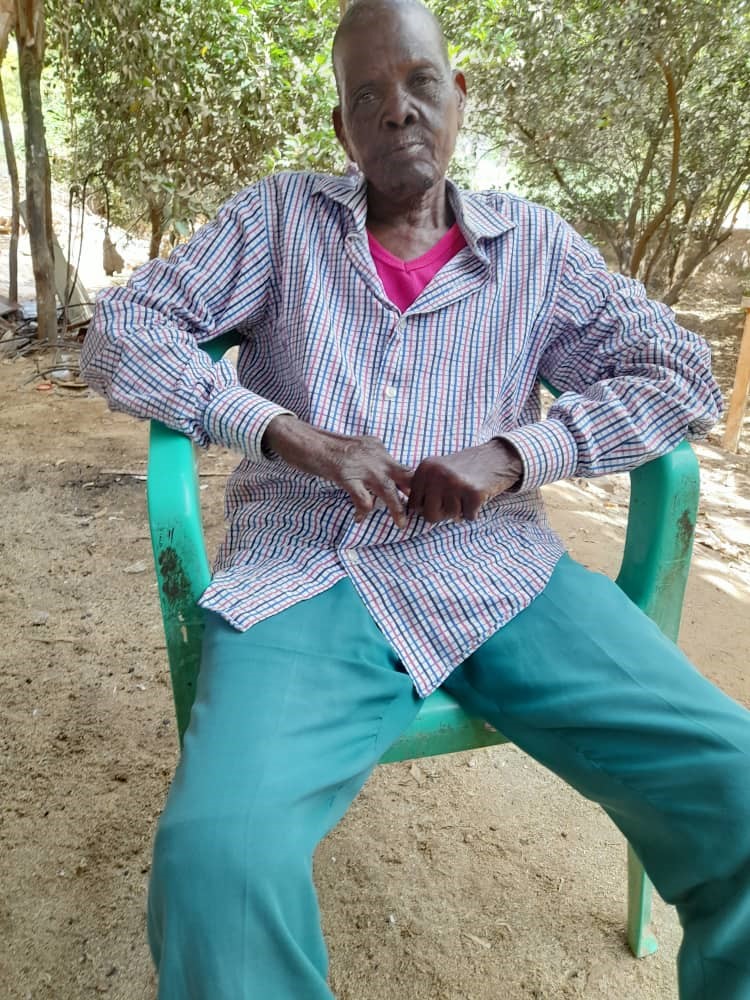 Cade from Hiran shares his thoughts about creating a better world for persons living with disabilities. Credit: WHO/Somalia
Cade from Hiran shares his thoughts about creating a better world for persons living with disabilities. Credit: WHO/Somalia
Cade from Hiran shares his thoughts about creating a better world for persons living with disabilities. Discussing the theme for the International Day of Persons with Disabilities, Cade says he hopes to see someone with a disability among the leaders running Somalia one day, so that he or she would understand the needs of persons with disabilities and make provisions to improve their lives.
Cade adds that he would like to see the federal and state ministries of health and all of Somalia’s partners develop functional equipment that would help people with different disabilities. He has heard in many countries governments and their partners have special cars, ramps and other specialized products to cater for people with special needs. This is what he feels Somalia lacks.
“As the world tries to deal with and recover from the COVID-19 pandemic, I hope people can realize how vulnerable one can feel if they are sick or different in any way from what we view as normal. I hope people make an effort to understand the challenges faced by people with disabilities, and work together to help them.”
World AIDS Day: Reaching more people with HIV services and reducing inequalities
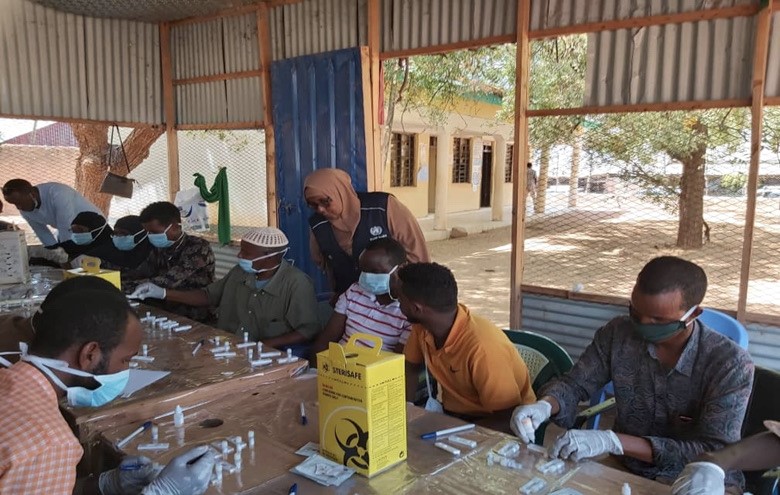 Teams conducting External Quality Assurance for HIV testing to verify quality of laboratory testing in Gedo
Teams conducting External Quality Assurance for HIV testing to verify quality of laboratory testing in Gedo
1 December 2021 - World AIDS Day is commemorated on 1 December every year to shed light on the plight of people living with human immunodeficiency virus (HIV) and acquired immunodeficiency syndrome (AIDS), and the challenges they face. This year’s global World AIDS Day is being held under the theme “End inequalities. End AIDS”. In the Eastern Mediterranean Region of the World Health Organization (WHO), the campaign has “Getting back on track – Focus on testing” as a regional theme in response to the disruption of HIV testing services during the COVID-19 pandemic, with a special focus on reaching the people left behind.
Given that HIV remains a major public health issue and is still a pandemic around the world, WHO is calling on global leaders and communities to rally to address the inequalities that drive AIDS and to try to reach those who do not have access to essential HIV services. The growing inequality, if not addressed, can only fuel and aggravate the divide between those having access to HIV testing and services and those who do not have access to testing, treatment and care.
HIV prevalence in Somalia
Periodic surveys conducted on the prevalence of HIV in Somalia have shown that the rate of infection has been dropping over the last 14 years. The findings of a 2014 survey showed that the HIV prevalence in Somalia had reduced to a level that could be classified as a low-level epidemic in all the states. The most recent survey, conducted during 2018, showed that average antenatal HIV prevalence across the country stood at 0.1% for all states. By geographical area, it was at 0.15% in Somaliland, 0.17% in Puntland and 0.04% in other federal member states. Despite the overall decline, the more dramatic drop in Somaliland, from just over 1.0% between 2004 and 2010, to 0.15% in 2018, meant that for the first time in 14 years of surveys, HIV prevalence in Puntland stood above that for Somaliland.
“The low HIV prevalence in Somalia can be attributed to Somali culture and society, and few risk factors as a result of behaviour,” said Dr Sadia Abdisamad Abdullahi, National HIV/AIDS Programme Manager.
Despite the general decline in HIV prevalence across Somalia, there are locations such as Garowe and Bosasso in Puntland where the infection rates have merely levelled off, with the risk of increasing yet again. The next survey among pregnant women is scheduled for 2023.
Salim Musa* – diagnosed with HIV in March 2014 and an advocate for supporting HIV and AIDS patients in Somalia – thinks the HIV rates may be higher in some groups and locations that were not covered in recent surveys. It is fairly easy for Somalis living in urban areas to access HIV tests and antiretroviral therapy (ART) free of cost in 17 health facilities in various states. For those in rural areas, it can be difficult for people to get tested, explains Salim. Most people do not even know about the symptoms of HIV and where to access services. It is usually at a late stage that many people living with HIV contact doctors for support.
Despite the challenges, by September 2021, 3784 patients were receiving ART at the 17 health facilities spread across different states, 72.5% of whom were already on the newer, more effective dolutegravir-based regimens.
Families, workplaces, health care workers and policies are key to bringing about change
Salim feels he was lucky – he credits his father, a doctor, and his well-educated siblings for encouraging him to seek early treatment after his diagnosis, and for giving him the confidence to deal with his struggles in life.
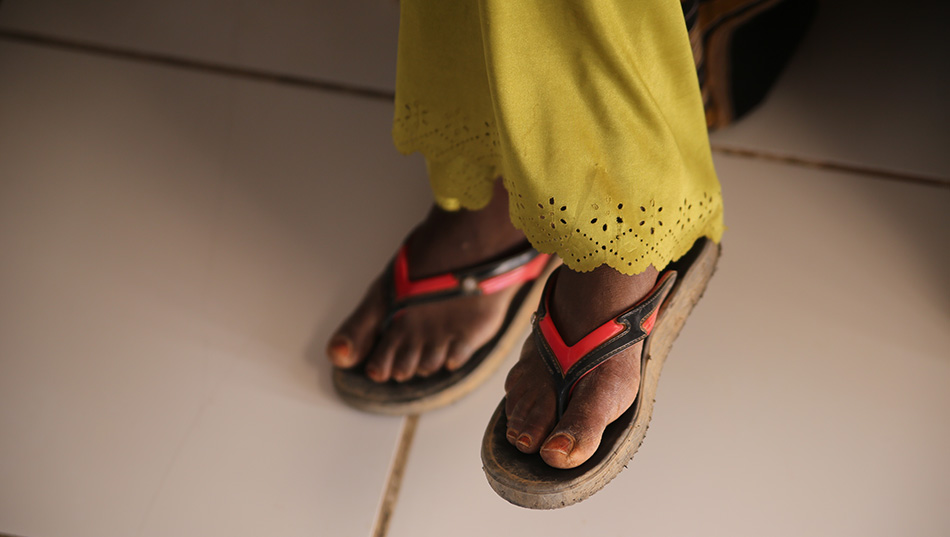 Persons living with HIV still face a lot of stigma, including in health facilities, in Somalia
Persons living with HIV still face a lot of stigma, including in health facilities, in Somalia
There is still a lot of stigma and shame associated with HIV in Somalia though, Salim adds. Years ago, at his workplace, people treated him very badly, and requested him to work from home so that no one could be in touch with him. This experience isolated him and forced him to leave to look for a more empathetic team. Now, Salim wears many hats – he works with nongovernmental organizations, vulnerable populations, the government, AIDS commissions, and technical advisors to advocate for the rights of people living with HIV. People he speaks to have been fired from their jobs or denied employment over their HIV positive status.
When Salim first visited a health facility to confirm his HIV status, he was surprised to see that the director of the facility, who tested him, was judgemental and overbearing, and did not respect him and other patients.
Salim shares some of the stories of patients he has worked with. One day, he spoke to a lady who was living with HIV and had fractured her leg. She was in excruciating pain. Even though she had enough money, Salim describes, not one doctor from nine hospitals she visited was ready to help her because of her HIV status.
In another case, a lady who was living with HIV contracted COVID-19. She rushed to the hospital when she needed oxygen but, sadly, no one helped her and she died. Another woman was forced to deliver her baby herself right at the doors of a hospital when medical personnel refused to let her in, as she was known to be HIV positive.
“I feel really sad when I hear these stories,” said Salim. “I feel that policy-makers should help enforce systems and oversight mechanisms to ensure that health personnel do not discriminate against any patients at all, including those living with HIV. No one should have to miss out on receiving medical care, and no health personnel should deny anyone services. They are in a profession where they must help others.”
“We must all work together to put an end to inequalities that leave Somalis out of the health service system. Decision-makers, health facilities, families and individuals all need to provide support to people living with HIV and prevent the spread of this disease,” said Dr Mamunur Rahman Malik, WHO Representative to Somalia. “Early testing and treatment can help people with HIV to battle this disease in good time.”
*Name changed to protect identity.


